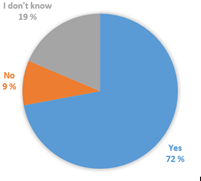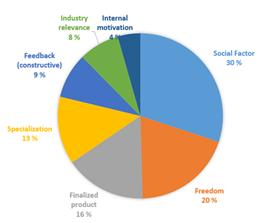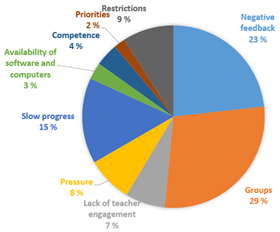GameLab
GameLab - Innovative Learning Activities in Project Subjects
By Robin Isfold Munkvold, Associate Professor at Game and Experience Technology, Faculty of Social Sciences, Nord University
June 20, 2022

At Nord University, the subject GameLab is part of the Game and Experience Technology education program. This subject has been part of the Game and Experience Technology curriculum since 2013 and was initiated in collaboration with the gaming pioneer Dino Dini, who has been in the gaming industry since the eighties.
GameLab is an internationally recognized term that describes a development environment connecting various individuals (technologists, artists, educators, students, businesses, and researchers) to develop games.
The teaching concept is a continuous subject in the bachelor's program, where students conduct a GameLab project every semester. This involves collaborative work in groups, guidance from teachers, and support from external industry experts.
Through GameLab, students are provided with an insight into how professional life functions right from the start. The concept is defined as a business simulator. This means that student teams must organize themselves as a typical gaming company and assume the various roles and responsibilities involved. The concept also has clear rules (GameLab rules) outlining how the execution should take place.
The subject is entirely devoid of traditional classroom teaching and begins with student teams pitching three different game ideas. Subsequently, in collaboration with one or more external advisors, the lecturers choose the idea they have the most confidence in, and the teams must then work on that idea for the rest of the semester.
Teachers "role-play" as project commissioners, alongside external advisors who are experts from the gaming industry, both nationally and internationally. Through weekly meetings with project leaders from each team, advisors provide tips and advice but also make decisions about whether the project needs more time or if it should be halted. If there's insufficient progress in the project or if it appears too challenging, it's better for the teams to start anew by brainstorming three new ideas and initiating the entire process again.
The external industry partners also serve as assessors in GameLab subjects and evaluate the team's portfolio. This portfolio includes process documents, logs, reflection notes, game design documents, and the actual game. Additionally, some student groups have real external clients and develop games commissioned by these clients.
GameLab also serves as an initial step towards a student business. A recently established company is North Camp Games, which began with the development of the game "Cards of Conflict," developed as part of a commission from the Center for Excellent IT Education (Excited).
There is a good correlation with the rest of the study program, even though GameLab subjects don't involve traditional classroom teaching. Students receive training in areas such as programming, drawing, 3D modeling, game design, project management, etc., in other parallel subjects. Students receive assistance along the way, but they dive straight into their first development project in the first semester.

The semester concludes with students presenting their products to each other.
A deeper investigation (Munkvold, 2018) revealed that the GameLab subject was the one students were most motivated to work on and the one they clearly spent the most time on throughout the semester. Students also highlighted that the perceived learning effect was greater in this subject than in other subjects.
Figure 1 illustrates this.
Furthermore, it was found that the social factor of working closely together in teams, having the opportunity to work on individual ideas, developing specialized skills, and working towards delivering a good game (product) was distinctly motivating. Figure 2 displays the factors that students found to be the most motivating elements within this learning concept.

During the initial years, the setup was conducted with strict and clear rules on how communication should occur between the team leader and the executive group (composed of two teachers and an external representative from the gaming industry). The role of the executive group was defined as a typical investor role, steering the direction of the projects. Students were tested on handling "difficult" clients who frequently posed new demands and expressed dissatisfaction when the weekly deliveries didn't meet expectations. Munkvold (2018) also highlighted typical demotivating factors while working on GameLab, mainly directed at intra-group challenges, negative feedback (from the executive group), and challenges in managing these. Figure 3 summarizes the typical negative factors reported by students during this period.

Based on Munkvold (2018), course evaluations, and overall experience gained through execution, several measures were implemented over time.
- Team Meetings Throughout the Semester: Experience revealed that several students felt unseen throughout the semester, as most of the communication between teachers and the external representative occurred via the team leader in the weekly meetings. Students also expressed a need for feedback on their own work. Therefore, the academic community initiated 2-4 meetings with each team every semester to increase contact with the entire student group and provide greater pedagogical support.
- Open Executive Meetings: A significant portion of communication took place directly between the team leader and the executive group. Many other students (not involved in the executive meetings) were curious about how this process occurred. Hence, the academic community chose to stream some of the weekly executive meetings to make it easier for all students to gain insight into the communication.
- Weekly Walkabouts: With further experience and continuous dialogue with students, it became evident that they still felt somewhat unseen and desired more direct contact (and interest) from the teachers. As a result, the academic community developed the concept of "walkabouts." This involved teachers weekly visiting group rooms and interacting with each team. Discussions about the project, teamwork, etc., occurred, allowing for close dialogue and rapid resolution of emerging challenges, making the entire student group feel seen and cared for. This concept continued during the COVID-19 pandemic, conducted digitally with weekly digital visits to the teams.
One of the external advisors was Tim Laning, CEO of Grendel Games (from the Netherlands). He stated the following about the GameLab concept:
As an external executive it's great to see the development of students as they work together in medium sized teams on a game project. The format works well from several points of view. Students get to experience what it's like to have to function within a team. This means that they learn to depend on others, and that they have to communicate in a transparent manner to other team members about not only their own progress, but also have to keep track of tasks and priorities set by the group, by their teachers and external executives. It also means that they have to fight for their own concepts and that they have to learn to accept to "kill their darlings" for the greater good: achieving the best results within the goals, deadlines and skill set. These lessons and skills are hard to learn and teach within a classical educational setting, and I believe that this format prepares students for their future in the game development industry in a responsible and educationally sound manner.
Another external advisor, Maria Gudmundsdottir, CEO of Indie firm Parity Games, mentioned the following about the concept:
As an executive for the game lab for few years, I think the overall format works well. Students get to produce 6 games during their studies with a glimpse into the industry through the executives. They not only get to produce many games but also learn that it takes time an effort to build a team, create a common vision and a product that everyone is passionate about. Good communication should never be underestimated and can be a crucial factor of pushing a game out the door. The game lab tackles this really well and can is good bridge into the video game industry.
A former student highlighted the following about the concept:
What I primarily believe makes GameLab great is the 'hands-on work' and 'learning by doing,' plain and simple. Additionally, we have plenty of time for R&D, which helps us understand what needs to be done in the game development process. Moreover, GameLab 'forces' you to work/collaborate with various individuals with different personalities, and that quickly teaches you how crucial communication within the team is, even if you're not necessarily 'best friends' otherwise.
All in all, we see that this way of working works very well for the students' learning outcomes and provides a solid foundation for work in the gaming industry and similar sectors. Among other things, the course allows for individual specialization in relevant areas—where students in project courses can undertake specific tasks (project management, programming, modeling, character development, level design, etc.).
All in all, we see that this way of working works very well for the students' learning outcomes and provides a solid foundation for work in the gaming industry and similar sectors. Among other things, the course allows for individual specialization in relevant areas—where students in project courses can undertake specific tasks (project management, programming, modeling, character development, level design, etc.).
